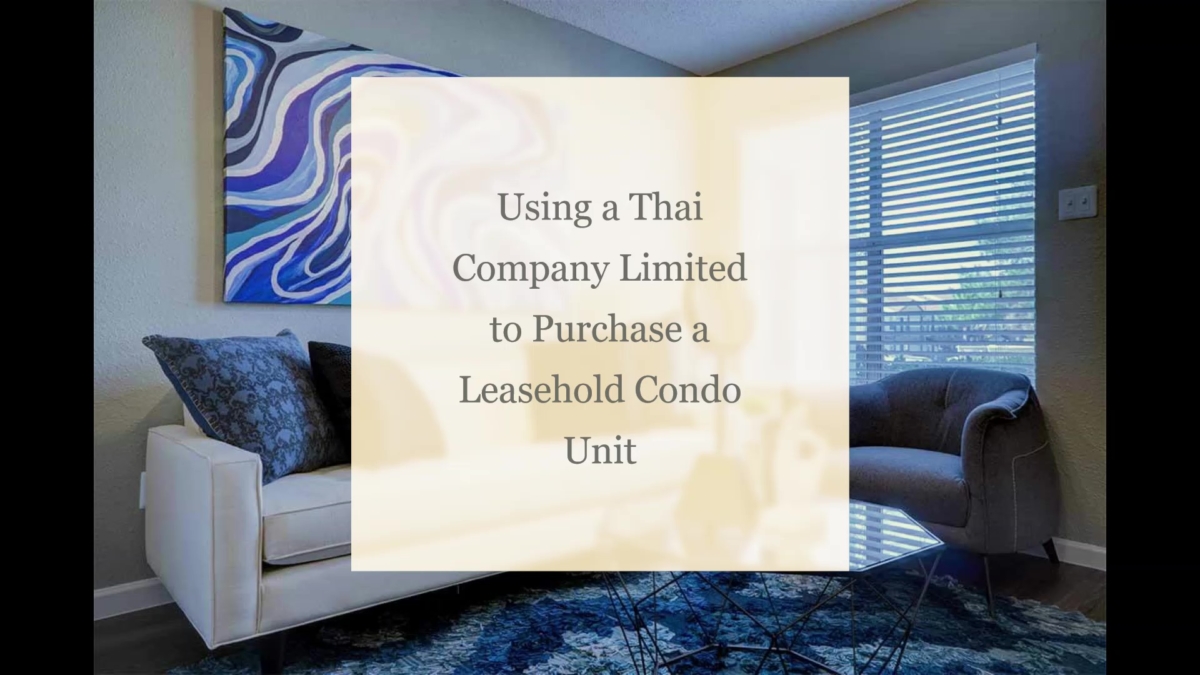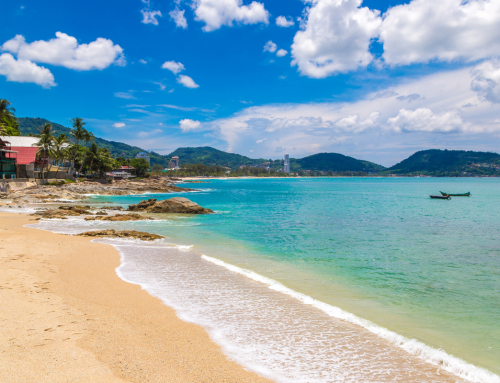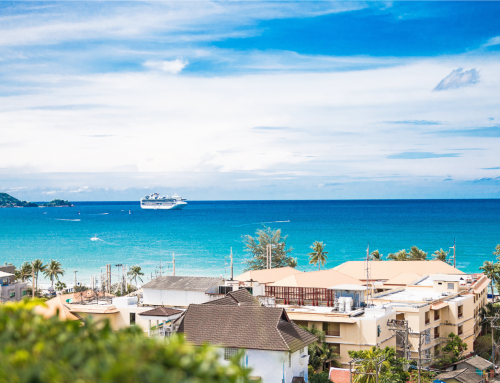If you are a foreigner looking to buy a condominium in Thailand, it is important to educate yourself on the types of ownership available.
Generally speaking, with condos, freehold units are your best option. However, many buyers also opt to set up a Thai Company in order to purchase a leasehold unit. Because the company is a Thai entity, that leasehold becomes a freehold unit under the law.
While this is a viable option, buyers must recognise that this ownership structure is not the same as a foreign freehold. In addition to being required to operate a company, that unit can only ever be resold to either a Thai national or another foreigner willing to take on the company structure.
Since a lease will ultimately expire, it can also be argued that company ownership is better than buying a leasehold, especially if the buyer gets a great deal on the Thai freehold unit in question.
Everyone, or certainly the vast majority of people, know that foreigners are not allowed to own land in Thailand.
A condo development is different in that a foreign national may own one or more units outright. The foreigner will jointly own a fraction of the land on which the building sits, but only if the total foreign ownership does not exceed 49% of the unit area of the resort.
With a freehold condo, a foreigner can feel secure because they also receive a Chanote Title deed issued by the local Land Department.
This confirms their full freehold ownership, and comprises part of the 49% of the development which is available to foreigners.
You may also want to read all about the benefits and advantages of owning a freehold condominium in Thailand:
The Benefits and Advantages of Owning a Freehold Condominium in Thailand
So What Happens With the Other 51%?
The growth of the condominium sector for foreigners has taken off considerably over the last 15 years. The last 5 years has seen some areas of the island almost unrecognizable to how they were before. Condos seem to be sprouting up everywhere.
In every condominium project 51% of the unit area must be owned by Thais. In some instances, the developer retains ownership of these units and uses them to generate rental income. Others are actually sold to Thais.
The problem is that many projects attract only foreign buyers, so it’s not always possible to find enough Thais who wish to live in an (almost) majority foreign owned resort.
In some resorts where foreigners would like to purchase a unit, but all the freehold units have been sold, they are allowed to acquire the Thai units as a leasehold.
This is allowed because the developer is a Thai company, meaning the units are still owned by a Thai entity. If they are leased, they remain “Thai owned,” which would not infringe on the 49% cap placed on foreign condominium ownership.
When a Leasehold Makes Sense
Of course, for some people a leasehold may be ideal.
For example, they may get the chance to buy at a significantly lower price than a freehold unit.
It may also make perfect financial sense because they were planning to rent long-term anyway, and by prepaying a leasehold for 30 years, they have no worries about inflation increasing their rent each year. For example, someone retiring may be looking for somewhere to live for the next 30 years, and therefore may not be overly concerned about selling the lease on to someone else.
And because the initial 30 years is registered at the land department their occupancy will be legally protected under Thai law.
When a Thai Company Makes Sense
There are also situations when the use of a Thai company to purchase a condominium makes perfect sense.
Occasionally, there are bargains to be had in Phuket that involve the purchase of a leasehold condo. For example, an owner who wishes to sell their leasehold unit may realise that the luxury condo they have owned for 15 years only has a further 15 years to run on the initial lease period. They have enjoyed their property for the last 15 years but now wish to sell the remainder of the lease.
It is highly unlikely they will receive back the original value as it will be hard to find a buyer willing to pay full price for only the remaining 15-year guaranteed lease period.
But someone in Phuket who already runs and controls a legitimate business with a Thai Co. Ltd. (or decides to set one up) has the option to purchase this unit as a Thai freehold at a significant discount. It might be for either personal use, for a rental business, or even as a company asset to provide accomodation for their staff.
Because they are purchasing a Thai freehold, not a leasehold with only a limited remaining lease period, they are buying it in perpetuity. In other words, the company they control will own it forever.
This is when the use of a Thai Company makes absolute sense.
What Could Be Called a Bargain on a Leasehold Condo?
If you are considering the purchase of a new build condo, and the sales agent is trying to convince you that a leasehold is so much cheaper than a freehold, that is the time for some healthy scepticism. In this situation, a leasehold is not the bargain the agent claims.
While you do avoid the freehold upgrade charge and the higher registration fees, it doesn’t mean you have hit the jackpot. There are other factors at play which should make it abundantly clear that buying a leasehold on a new build really isn’t worth it.
It may look like a bargain initially, but after a few years the leasehold owner starts to realise they may have made a mistake by not going for the freehold condo. If the leaseholder has been living in the condo, and decides to leave Thailand, finding a buyer for a leasehold will not be as easy as it would be for a freehold.
Setting up a Thai Co. Ltd. would give them the option of transferring Thai freehold ownership to the company, rather than being limited to the time remaining on a lease. While this would make it easier for them to sell on to a new buyer, it may be a complication and an expense they are not willing to deal with.
It is also possible that they have bought within a resort which also has a number of freehold owners wishing to sell. If that’s the case, then the leasehold owner must be willing to sell at an extremely competitive price if they are to attract buyers who can just as easily buy one of their neighbours’ freehold condos.
It is here when they are forced to accept the fact that, in the resale market, their unit is not the same as a freehold. In order to complete the sale, they must offer their unit at a much lower price. Much obviously depends on the quality of the development and the current market sentiment, but some discrepancy between freehold and leasehold resale prices is a reality.
The notion of a bargain is obviously a subjective one, but we would argue that when leasehold condos resell for 10% less than an equivalent freehold, as they often do, this still hardly represents a bargain. Especially when the time remaining on the initial lease ticks down towards zero with each year that passes.
The Problems with Entering a Lease Agreement Without a Thai Company
A lease agreement is technically not real ownership. It is essentially a tenancy agreement for a legally fixed term, which may not exceed 30 years. You don’t get a Chanote title and you don’t get voting rights within the resort.
You may (or may not) see the leasehold renewed at the end of this 30-year term, but this is far from guaranteed. An extension is only a promise made by an individual or a developer, and you may find it is not enforceable when the time comes.
This is why many people decide to set up a Thai Company and purchase the same unit, only instead of being a leasehold, it is a freehold in the name of the Thai entity.
The property may then be owned through the company in perpetuity, not just for the initial 30-year period. This sense of freehold ownership is probably the main reason why people decide to purchase what to a foreigner would otherwise be leasehold units.
After all, the Thai Company actually “owns” the unit. It doesn’t lease it. And since the foreigner exercises a certain amount of control of the Thai company, it certainly makes far more sense than just taking out a lease.
Is a Thai Company Truly An Ideal Solution?
Many Phuket real estate agencies suggest setting up a Thai Co. Ltd. to own a low cost condominium is an ideal solution. It is certainly a solution, but for cheap condos there are other factors to consider.
Of course a Thai company can be kept open for as long the shareholders wish, and it overcomes all the problems that arise from renewing lease periods in the future.
And if you run a genuine business – one that generates revenue, pays taxes, has proper accounting, legitimate Thai shareholders, and adheres to the corporate laws of Thailand – your company may purchase landed property in Thailand for business purposes.
It is true that prior to 2006 many people held companies which had no business activity at all. These were mostly holding vehicles, set up specifically for the foreign shareholders to own and live in a landed property such as a house or villa.
The crackdown by the authorities in 2006 put a stop to this, and the practise of using straw men and holding companies died down for a while. Although it curtailed the practice to some extent, the new legislation and guidelines from the Land Department did not have the desired lasting effect.
It could be said that in the vast majority of cases where a foreigner uses a Thai Company to buy a leasehold condo (from the 51% of units designated for Thai ownership), the company is employing nominee shareholders. Most people are aware that while company ownership is allowed, using nominee shareholders is always questionable. It may be violating both the Foreign Business Act and the Condominium Act. Section 67 of The Condominium Act specifically states that anyone owning a condominium unit on behalf of an alien (foreigner) shall be subject to penalties.
You may read the full English translation of the Condominium Act 2008 amendments provided by the Thai Government’s Department of Lands here:
https://www.dol.go.th/estate/Pages/act%202008.pdf
But foreigners who do things correctly through an experience lawyer have nothing to fear. For example, someone may have established a legitimate property rental business, file their accounts, and pay their taxes. And they may also have found legitimate Thai investors/shareholders for their company.
It must be also be said that to our knowledge the government has yet to ever clamp down on Thai companies that own condominium units which form a part of the 51%. The more pressing issue for them is Thai companies that own landed property. So although the use of a Thai company to own a condo may be a grey area and frowned upon by some, the setting up a Thai company is still a far better option than entering into a straight forward leasehold contract. The reality of a leasehold contract is that the buyer owns nothing.
The point that can not be overly stressed here is that, irrespective of what your views are on the subject, buying a condo using a Thai Company Limited (especially if done correctly) can still be considered a solid investment. Buying a leasehold condominium can not.
The Additional Running Costs Involved with a Thai Company
Buyers are typically not aware of the cost involved in running a Thai company. It is not really cheap – especially if you are doing things correctly. There are cheap versions available from cheap accountants and lawyers, but these may not hold up under scrutiny.
And there is not only the expense of setting up the company, but the running costs each year also add up. Again, this is not cheap if done correctly.
For example, accounts must be prepared every year and filed with the authorities. Tax returns must also be submitted and taxes paid. In addition, an accountant or lawyer will almost certainly be needed to prepare all the documentation, and they do not work for free.
Because of these expenses, owning a low-end condominium through a Thai Co. Ltd. makes absolutely no financial sense. If you are buying a condo as an investment property, you must ensure that expense of running the Thai company is not completely swallowed up by the rental income you will realistically be earning.
Selling a Leasehold Condominium Owned Through a Thai Company Compared to Selling a Straight Forward Leasehold
If you have picked up a bargain property this is not really an issue, but if you purchased a new build leasehold condo unit at full price then you will probably find it harder to sell.
Some owners who have purchased leasehold units for roughly the same prices on new developments question the differentiation. They believe their unit(s) should be viewed exactly the same as freehold units within the same development. They simply do not understand the differentiation between leasehold and freehold. This belief may stem from what they were told by self-serving real estate agents, or from improper legal advice they received when buying their leasehold condo unit in the first place. But the reality is that when they take out a lease, they don’t technically own anything. Unfortunately, this is something they may not find out until they decide to pass ownership onto another party.
On the other hand, just as people buy villas through a Thai Company Limited, there is nothing to stop them purchasing luxury condominiums in the same way. Luxury condominium units held by legitimate Thai corporate structures which generate extremely attractive rental returns are much easier to sell, especially if they are offered at realistic prices.
The Costs When You Sell Through a Thai Company
One thing we must point out is that the costs involved in selling a property owned by Thai Company Limited may be higher.
We have always stressed that Thailand is an extremely conducive environment for investing in real estate. The government goes out of their way to attract new investment by keeping taxes low, and this includes sales taxes.
But when selling, anyone owning a condominium in their own name for longer than 5 years significantly reduces their tax upon sale. By contrast, if a property is sold through a Thai company, the tax rate would be a minimum of 3.3% of the sale price, although could possibly be higher depending on capital gain.
Conclusion
When contemplating a condominium purchase in Phuket there are many relevant points which every buyer must consider.
If a foreigner finds an amazing bargain on a leasehold unit, and aims to do things correctly, then it is certainly a better option for them to own freehold through a Thai Company. Taking the unit on a leasehold basis would limit the length of time they may stay there, and it would also offer little or no re-sale value.
Read more of our related articles on the Phuket real estate market:
The Importance of Sound Legal Advice
Condominiums Explained – What is a Condominium?
The Things All Phuket Condominium Investors Should Know About the Condominium Act
Owning a Freehold Condominium through an Offshore Company
Owning a Freehold Hotel-Licensed Condominium in Thailand
Reasons to Invest in Phuket Property for New and Experienced Investors
Illegal Home Ownership in Thailand – An Inconvenient Truth
China’s Spending Spree on Phuket Real Estate
Buying Freehold Villas or Houses in the Name of a Thai Spouse





Social Contact